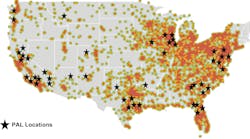With today’s regulatory action, Mexican carriers applying to operate anywhere in the U.S. will be required to have a distinctive USDOT number, have their vehicles pass a safety inspection and undergo intensified safety monitoring during an 18-month provisional period, and provide supplemental safety certifications as part of the application process.
Mexican commercial vehicles will be permitted to enter the U.S. only at commercial border crossings and only when a certified motor carrier safety inspector is on duty.
The regulations also will require Mexican carriers operating in the United States to have a drug and alcohol-testing program, a system of compliance with U.S. federal hours-of-service requirements, adequate data and safety management systems and valid insurance with a U.S. registered insurance company.
The carrier’s ability to meet these requirements will be verified by a safety audit conducted by qualified U.S. inspectors prior to receiving provisional authority to operate to and from the U.S. At least half of the safety audits, which are to be conducted by qualified inspectors, must take place in Mexico.
“President Bush and I are committed to extending the benefits of free trade throughout North America while ensuring that a strict and rigorous safety regime is established and enforced,” U.S. Transportation Secretary Norman Y. Mineta said. “The steps taken today will help ensure that all trucks, buses and drivers entering the U.S. from Mexico meet U.S. safety standards and operate safely on U.S. roads when we implement the truck and bus provisions of NAFTA.”


